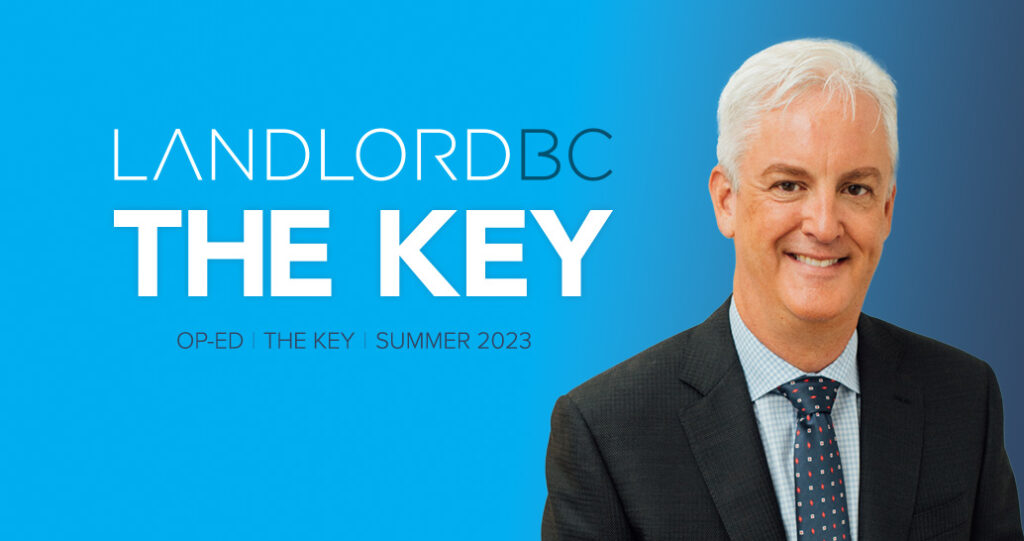Op-ed: Canada’s Housing Crisis

Op-ed originally published in BC Landlord’s THE KEY Summer 2023.
Canada doesn’t have enough housing. That’s a fact that people from all walks of life, from across the political spectrum, and from all corners of Canada, can agree on.
It becomes disappointingly evident to the prospective first-time home buyer who finds the growing gap between supply and demand means the prices are beyond their reach. It’s also apparent to the young person trying to find their first apartment, and must readjust their plans because they are priced out of the neighbourhood or city they dreamed of living in.
Canada needs 5.8 million new homes by 2030 to keep up with the housing needs of young people, new Canadians, and people transitioning to different stages of life.
Many people pin the blame on providers and builders of rental housing for Canada’s housing affordability and supply crisis — and that’s just wrong.
REITs & housing providers work together
New housing peaked in the 1970s and there hasn’t been a concerted effort to continue to support the supply of new housing since then. What there has been in recent years is a lot of finger-pointing at real estate investment trusts (REITs), such as my company CAPREIT, for driving up rents and contributing to the housing supply deficit.
In fact, we are part of the solution — not the problem.
Residential REITs control less than six per cent of the purpose-built rental stock, which is less than three per cent of the total rental market. The vast majority is owned by small investors, supporting families with additional income.
More than half of our suites are rented at affordable rates, as defined by Canada Mortgage and Housing Corporation (CMHC). That means that rental prices are less than 30 per cent of the average area renter’s income. A report published by CIBC Capital Markets in April 2022 underscored this affordability factor: “Estimated rent as a percentage of average household income across the REIT sector is, on average, under 20 per cent, making it some of the most affordable housing in the country.”
There is no one-size-fits-all solution to housing more Canadians quickly — and at a rate that’s affordable. No single group can solve the crisis on its own. The REIT community is one of many interested groups that has committed to starting the conversation with government and private stakeholders to get more shovels in the ground.
What REITs can do to help increase supply
Taxation, regulations and pointing blame have never spurred on investment or innovation in any industry. Rental housing is no exception.
Canada simply hasn’t been building enough housing. Despite our growing population, we built more homes in the 1970s than any decade since — even as our population has nearly doubled. Back then, proven public policies were in place to encourage large-scale investment and construction of purpose-built rental housing.
We can choose to build new housing in communities across the country supported by modern infrastructure to build connections with the rest of the region, province, and country.
We can build communities, provide jobs and economic opportunities for current residents and new arrivals. In driving this ambitious future, REITs can be an invaluable economic tool. Using the power of global capital markets and working in partnership with smart government investment, REITs can play an enabling role as Canada builds like never before.
Collectively, the REIT group has tens of thousands of new homes in the development pipeline. We have a lot of ideas on how to tackle the housing shortage. Here are some of them.
Solution One: Affordable Acquisition Fund
What about protecting existing renters?
We believe there are smart policies that will allow the government to protect long-term affordability for the least-advantaged renters at a fraction of the cost of new affordable housing. Championed by the NDP and the provincial government in British Columbia and supported by our industry, the creation of an Affordable Acquisition Fund would enable the sale of existing market-based affordable rental apartments from the for-profit sector to nonprofit organizations, co-operative and community land trusts (NPOs for short), making them permanently affordable.
These NPOs can do this with relatively little government support. In practice, governments could deliver large-scale permanent housing affordability for between one-third to one-half the cost of building new affordable homes. Another advantage would be that REITs, pension funds and other large scale for-profit housing providers would reinvest the revenue from these sales back into building new housing supply. British Columbia Premier David Eby announced a $500-million acquisition program for that province. The federal government can take this approach and scale it nationally.
Solution Two: Reserve more Affordable Housing with Enhanced Supportive Financing
Canada’s REITs have tens of thousands of suites that meet the CMHC’s definition for affordable rents (30 per cent of median renters’ income) and many more that are near the margin.
If the Government of Canada or the CMHC were to expand their low-cost financing supports to existing buildings in exchange for commitments to maintain affordability per the MLI Select conditions, many more affordable homes could be secured. These financing incentives could include attractive rates, reduction, or waiver of CMHC premiums, higher loan to value, or longer amortization or non-amortizing mortgages. Suddenly, there would be a lot more incentive for the for-profit companies to expand affordability options and create greater options for renters.
Solution Three: Manufacture Your Way to Affordability
CAPREIT has nearly 500 homes in manufactured home communities (MHCs) in secondary and rural areas across British Columbia. CAPREIT has more than 12,000 MHC lots across the country in rural settings. They are typically within 20 minutes of a smaller destination.
MHCs offer some of the most affordable market housing in Canada. Compared to building homes on site, manufacturing in a factory setting using assembly line methods dramatically reduces the production cost of new housing.
Located on smaller lots than traditional detached homes, MHCs are a tool in reducing sprawl in rural areas, reducing municipal servicing costs, and when situated in a land lease community, they greatly reduce the upfront cost to new homeowners.
MHCs can be built and installed quickly and efficiently, and can help — especially in rural and remote areas — to scale up housing availability and help attract and retain residents, especially newcomers to Canada. Manufactured homes can be much more affordable than conventional homes, being the most affordable of the affordable housing in the rural setting.
Unfortunately, a negative public perception persists, and that sentiment is matched with restrictive provincial land use regulations and zoning that prevents their use in many areas. There are also outdated performance standards that were developed in an era where manufactured homes were more akin to portable trailers.
Expanding the availability of these homes by lessening the red tape, especially in rural and secondary markets, would allow homeowners to stay and thrive in these communities. It would also help attract talent and new people to what are often dying communities.
Solution Four: Set National Standards to Align Housing, Immigration and Land Use Policies
Residential REITs continue to move ahead with our development pipeline, both on our own and with experienced development partners. CAPREIT has a significant amount of what can be called “free land.”
On many of our properties we can construct new buildings or add suites through intensification at an affordable cost. We would like to partner with the Government of Canada and continue with these plans going forward. The easiest solution to incentivize affordable housing is for CMHC to adjust its MLI Select formula (new multi-unit mortgage loan insurance product focused on affordability, accessibility, and climate compatibility) to promote affordability, and the Government of Canada to incentivize provinces and territories to reduce up-front costs from preventing new affordable construction.
However, the municipal philosophy of “growth pays for growth” in many provinces creates a barrier of high up-front costs for new construction, which impedes the creation of affordable housing. This approach is counterproductive to addressing the affordability crisis. Property taxes are the primary funding mechanism for municipalities. Yet, for affordable housing providers, it is an ongoing additional cost and barrier to maintaining affordability for low-income residents.
Some municipalities have recognized this barrier and have, in limited ways, waived these costs to incentivize new affordable housing construction. These are worthwhile initiatives and can make the difference between a project being viable or not. This should be the norm, not the exception.
But the greatest impact could be made if the Government of Canada worked with the provinces and territories to support long-term exemptions from municipal property taxes in exchange for long-term commitments to maintain affordable rental rates.
More Housing
As the CMHC has noted, we need to build a lot more housing.
Canada has the fewest homes per capita in the G7, but our population is growing at the quickest pace. Think about this: we have the most land, the lowest density, and yet we have the highest home prices.
The REIT industry, along with many of our colleagues across the purpose-built rental community, is ready and able to roll up our sleeves and do our part to address the housing crisis.
Building new homes — single and multi-family — will help restore housing affordability for all Canadians, and it can also unleash our next great economic opportunity. The time to act is now.
More from Mark Kenney:
Op-ed: BC Landord – Canada’s Housing Crisis
https://www.capreit.ca/op-ed-canadas-housing-crisis/
Op-ed: As Canadian housing crisis rages on, is ‘financialization’ really to blame?
https://www.capreit.ca/op-ed-as-canadian-housing-crisis-rages-on-is-financialization-really-to-blame/
BNN Bloomberg Interview with Mark Kenney – The Housing Crisis in Canada
https://www.capreit.ca/bnn-bloomberg-interview-with-mark-kenney-the-housing-crisis-in-canada/
Canada’s next great economic boom can be unleashed by the power of housing, immigration, and labour
https://www.capreit.ca/canadas-next-economic-boom-can-be-unleashed-by-housing-immigration-labour/
BNN Bloomberg Interview with Mark Kenney – Incredible problems with lack of supply
https://www.capreit.ca/bnn-bloomberg-interview-with-mark-kenney-incredible-problems-with-lack-of-supply/
Celebrating 25 Years
https://www.capreit.ca/celebrating-25-years/
News

CAPREIT deploys $293 million into strategic acquisitions

CAPREIT completes sale of International Plaza to Nch’ḵaý Development Corporation

Julian Schonfeldt on The CRE Podcast: How smart incentives are unlocking housing solutions

CAPREIT announces $297 million in new strategic repositioning since Q2 2025

Op-ed: To build a better housing market, stop taxing housing like cigarettes
